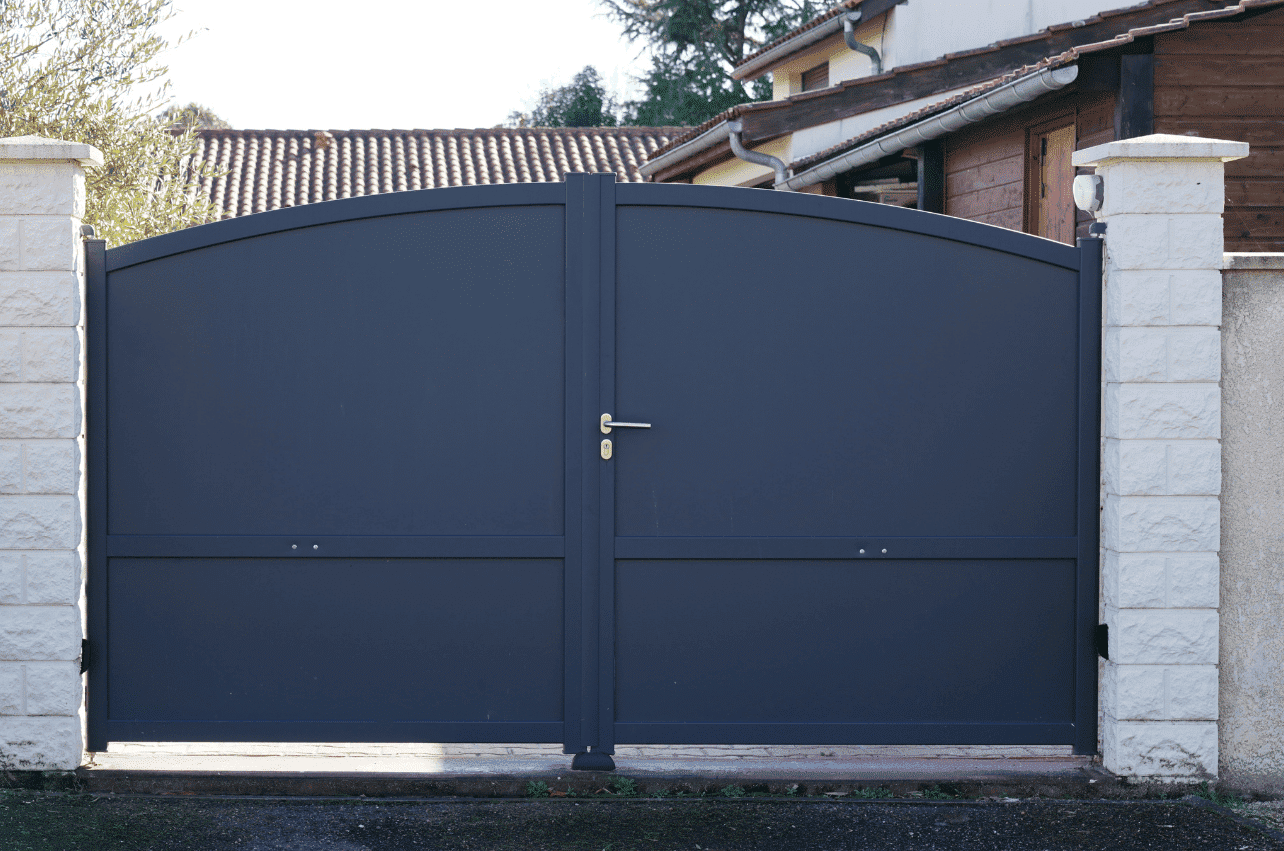Swing vs. slide gate operators: a decision that property owners must make when it comes to choosing the right gate operator for their premises. Both options have their advantages and disadvantages, making it crucial to weigh the factors involved before making a final decision.
This article aims to provide an objective analysis of swing and slide gate operators, highlighting their key differences, pros and cons, space requirements, safety considerations, maintenance requirements, and cost implications.
When considering swing gate operators, one must take into account their ability to provide a traditional aesthetic appeal to the property. These gate operators are designed with hinged arms that allow the gates to swing open or close in a manner similar to conventional doors.
One advantage of swing gate operators is their ability to operate during power outages, as they can be operated manually. However, they require adequate space for the gates’ swinging motion and may not be suitable for properties with limited space or inclines.
On the other hand, slide gate operators offer a more practical solution for properties with limited space or driveways on an incline. These systems feature gates that glide horizontally along a track parallel to the fence line when opening or closing. Slide gate operators are known for their smooth operation and reliability but may require additional safety measures due to potential entrapment hazards if not properly installed or maintained.
By objectively analyzing factors like aesthetics, space requirements, safety considerations, maintenance needs, and cost implications associated with both types of gate operators – swing and slide – property owners can make an informed decision that best suits their specific needs and preferences. Understanding these aspects will help determine which option offers optimal security while seamlessly integrating with the overall design of the property.
Swing and Slide Gate Operator’s Key Differences
The key differences between swing and slide gate operators are important to consider when choosing the appropriate option for your specific needs. Swing gate operators operate by swinging the gate open or closed, while slide gate operators move the gate horizontally along a track. This fundamental distinction in movement affects various aspects of their operation and installation.
One significant difference between swing and slide gate operators is the space required for their operation. Swing gates require an area in front of and behind the gate equal to its width to allow for full swing motion.
This can be a limitation in properties with limited space or those located close to a road or sidewalk. On the other hand, slide gates are ideal for properties with restricted spaces as they only require room along the fence line for lateral movement.
Another distinguishing factor is the level of security provided by each type of operator. Swing gates offer better security due to their solid construction and lack of exposed tracks or wheels that could be tampered with.
They can withstand higher levels of force and are more difficult to breach compared to slide gates which have exposed tracks that could potentially be manipulated by intruders.
Maintenance requirements also differ between swing and slide gate operators. Slide gates tend to have simpler mechanisms, resulting in lower maintenance needs compared to swing gates which require regular lubrication of hinges, inspection of hydraulic systems (if applicable), and adjustment of closing forces. The simplicity of slide gate mechanisms often translates into reduced long-term costs associated with repairs and upkeep.
Considering these key differences between swing and slide gate operators is essential in making an informed decision about which option best suits your specific needs. Factors such as available space, desired level of security, and maintenance considerations should all be taken into account when selecting a suitable operator for your property’s entrance system.
Pros and Cons of Swing Gate Operators
One important consideration when choosing between swing and slide gate operators is evaluating the advantages and disadvantages of swing gate operators. Swing gate operators have several benefits that make them a popular choice for many homeowners and businesses. First, swing gates offer a more aesthetically pleasing look compared to slide gates. They provide a classic and elegant appearance that can enhance the overall curb appeal of a property.
Another advantage of swing gate operators is their versatility in terms of gate design. These operators can be installed on various types of gates, including single-leaf or double-leaf gates, allowing for flexibility in choosing the style that best suits the property’s needs.
Swing gates can be made from different materials such as wood, iron, or aluminum, providing options for customization based on personal preferences.
However, swing gate operators also come with some drawbacks. One major disadvantage is the space requirement for the swinging motion of the gates. Swing gates require sufficient clearance both inside and outside the property to allow for their full range of motion.
This can be problematic for properties with limited space or those located near sidewalks or roads where there may not be enough room for the gate to swing open without obstructing pedestrian or vehicle traffic.
Another downside of swing gate operators is their slower operation compared to slide gates. Swing gates take longer to open and close as they need to complete a full swinging motion before fully opening or closing. This can be inconvenient if quick access is needed or if there are frequent entries and exits throughout the day.
While swing gate operators offer an attractive appearance and design versatility, they also have limitations in terms of space requirements and slower operation speed. When deciding which to get, consider these factors along with specific site requirements to determine which option best meets your needs.
Pros and Cons of Slide Gate Operators
Considering the advantages and disadvantages of slide gate operators is crucial when making a decision between swing and slide gate options. Slide gate operators have several benefits that make them a popular choice for many individuals.
- Slide gate operators are known for their space-saving design. Unlike swing gates that require ample space to open and close, slide gates operate by sliding horizontally along a track, which makes them ideal for properties with limited space.
- Slide gate operators offer enhanced security features. These operators typically come with safety sensors that detect obstacles in the path of the gate, preventing accidents or damage to vehicles or individuals.
- They can be equipped with advanced access control systems such as keypads or card readers to further enhance security measures.
However, it is important to consider the drawbacks of slide gate operators as well. One disadvantage is that they may require regular maintenance due to their complex mechanical components. The sliding mechanism involves gears, rollers, and tracks that need periodic lubrication and inspection to ensure smooth operation.
If there is any damage to these components, repairs might be more time-consuming and costly compared to swing gate operators. Another drawback of slide gate operators is their vulnerability during power outages or emergencies since they rely on electricity for operation. Have a backup power supply system in place to prevent being locked inside or outside the property during such situations.
While slide gate operators provide space-saving design and enhanced security features, they do require regular maintenance and may pose challenges during power outages or emergencies. Prospective buyers should carefully evaluate their specific requirements before making a decision between swing and slide gate options by considering factors like available space, desired level of security, maintenance capabilities, and potential backup power solutions.
Safety and Maintenance Considerations
Safety and maintenance considerations are crucial factors to keep in mind when deciding on the type of gate system for your property. Both swing and slide gate operators have their own unique safety features and maintenance requirements that need to be considered.
When it comes to safety, swing gate operators offer certain advantages. These systems typically have built-in safety sensors that can detect any obstruction in the path of the gate. This ensures that the gate will stop or reverse its direction if it encounters an object or a person, reducing the risk of accidents or injuries.
Swing gates usually require less force to open and close compared to slide gates, which can further enhance safety by minimizing the potential impact if someone accidentally gets caught between the gate and a solid surface.
On the other hand, slide gate operators also have their own safety features. Most modern slide gates come equipped with photoelectric sensors that detect any movement near the gate and automatically prevent it from closing.
This is particularly useful in preventing accidents involving vehicles or pedestrians who may inadvertently enter the path of a closing gate. Some slide gates are designed with anti-climb features such as spikes or smooth surfaces to deter unauthorized access.
Both swing and slide gate operators require regular upkeep to ensure optimal performance and longevity. Swing gates may require more frequent lubrication of hinges and moving parts due to their pivoting motion. They also tend to accumulate debris like leaves or twigs at their base, which should be regularly cleared out to prevent obstruction. On the other hand, slide gates rely on rollers or wheels for smooth operation, which may need periodic cleaning and lubrication as well.
When choosing between swing and slide gate operators, consider not only your specific space requirements but also important safety features and maintenance needs associated with each type of system. A thorough assessment of these factors will help determine which option best suits your property’s needs while ensuring both security and convenience.
Cost Implications: Investment and Long-Term Value
When considering the installation of a gate operator, safety and maintenance considerations are crucial factors to take into account. Another important aspect that should not be overlooked is the cost implications associated with this investment and its long-term value. By analyzing the financial aspects of swing and slide gate operators, individuals can make an informed decision based on their budget and desired return on investment.
One significant cost implication is the initial investment required. Swing gate operators generally tend to be more affordable compared to slide gate operators. This is mainly due to the simpler mechanism involved in swinging gates open and closed. On the other hand, slide gate operators require additional components such as tracks or wheels for smooth lateral movement, which contributes to higher upfront costs. Therefore, for those operating on a tight budget, swing gate operators may provide a more financially viable option.
In addition to the initial investment, consider the long-term value provided by each type of gate operator. Firstly, maintenance costs should be taken into consideration. Swing gate operators typically have fewer moving parts compared to slide gate operators, leading to lower maintenance requirements over time.
The simplicity of their design often results in reduced expenses related to repairs or replacements of components. Secondly, energy consumption can impact long-term costs as well. Slide gate operators generally require more power due to their continuous sliding motion compared to swing gate operators, using less energy during operation.
By carefully evaluating these cost implications along with other factors like security needs and space availability, individuals can make an informed decision regarding which type of operator aligns best with their requirements while also considering long-term financial considerations.
Factors to Consider for Your Property
One important factor to consider is the size and type of gate you have. Swing gate operators are generally more suitable for smaller gates, as they require less space to operate effectively. On the other hand, slide gate operators are better suited for larger gates or properties with limited space, as they operate by sliding the gate horizontally along a track.
Another factor to consider is the level of security required for your property. Swing gates offer a higher level of security due to their design. When closed, swing gates provide a solid barrier that is difficult to breach. Slide gates can also provide adequate security when combined with additional safety features such as electronic locks or access control systems.
The terrain and climate conditions of your property should also be taken into account when choosing between swing and slide gate operators. Swing gates are generally more versatile and can be installed on uneven or sloping terrain without significant modifications.
In contrast, slide gates require a flat surface and may not be suitable for properties with steep slopes or rough terrain. Extreme weather conditions such as heavy snowfall or strong winds may affect the operation of either type of gate, so it’s important to choose one that can withstand these conditions.
When deciding between swing and slide gate operators for your property, multiple factors need to be considered. The size and type of your gate, desired level of security, and terrain/climate conditions are all critical elements that should influence your decision-making process. By carefully evaluating these factors, you can ensure that you choose the most suitable option that meets both your immediate needs and long-term requirements for your property’s access control system.
When it comes to securing your property, choosing the right gate operator is crucial. Both swing and slide gate operators have their own unique advantages and are suitable for different types of installations. Here’s a comparison of some top products to help you decide which type of gate operator best meets your needs.
Swing Gate Operators
Swing gate operators are ideal for properties where space inside the gate allows the gate to swing open and close. These operators are often preferred for their aesthetic appeal and smooth operation.
1. HySecurity SwingSmart DC 20
The HySecurity SwingSmart DC 20 is a top choice for residential and commercial applications. It offers reliable performance with advanced features like battery backup and Smart Touch controller for easy programming.
- Key Features:
- Supports gates up to 20 feet and 1,300 pounds
- Energy-efficient DC motor with battery backup
- Smart Touch controller with LCD display
- Smooth and quiet operation
2. LiftMaster LA500
The LiftMaster LA500 is known for its robust build and high performance. It is suitable for both single and dual swing gate applications, offering reliable operation even in harsh weather conditions.
- Key Features:
- Solar-ready ultra-reliable system
- MyQ Technology for remote monitoring and control
- Battery backup system
- Easy installation and maintenance
3. FAAC 400 CBAC
The FAAC 400 CBAC is a powerful hydraulic swing gate operator designed for heavy-duty applications. It is suitable for large residential gates and light commercial use, offering long-lasting and reliable performance.
- Key Features:
- Supports gates up to 15 feet and 1,100 pounds
- Hydraulic operation for powerful performance
- Adjustable opening and closing speeds
- Built-in manual release for emergencies
Slide Gate Operators
Slide gate operators are ideal for properties with limited space behind the gate. These operators allow the gate to slide along the fence line, making them suitable for both residential and commercial applications.
1. HySecurity SlideSmart HD 25
The HySecurity SlideSmart HD 25 is a heavy-duty slide gate operator designed for high-traffic commercial and industrial applications. It offers advanced features and robust performance for demanding environments.
- Key Features:
- Supports gates up to 2,000 pounds and 50 feet
- Powerful and efficient DC motor with battery backup
- Smart Touch controller with diagnostic capabilities
- Durable and weather-resistant design
2. LiftMaster SL3000UL
The LiftMaster SL3000UL is a reliable and durable slide gate operator suitable for both residential and commercial properties. It offers smooth operation and is designed to handle heavy gates with ease.
- Key Features:
- Supports gates up to 1,000 pounds and 37 feet
- MyQ Technology for remote access and control
- Heavy-duty gear-driven transmission
- Integrated battery backup
3. FAAC 844 ER
The FAAC 844 ER is a powerful slide gate operator designed for industrial and commercial applications. It provides reliable performance and can handle heavy gates with smooth and efficient operation.
- Key Features:
- Supports gates up to 2,200 pounds
- Heavy-duty oil-bath gear motor
- Reliable and durable construction
- Easy to program and maintain
Choosing the Right Gate Operator
When deciding between swing and slide gate operators, consider factors such as available space, gate weight, frequency of use, and environmental conditions. Swing gate operators are typically chosen for their elegance and simplicity, while slide gate operators are preferred for their space-saving design and robustness in handling larger gates.
For personalized recommendations and to explore more options, contact R3 Access at 215-364-5868 or visit our website at r3accessinc.com. Our experts can help you find the perfect gate operator to meet your specific requirements and ensure optimal security and functionality for your property.
Follow us on linkedin


